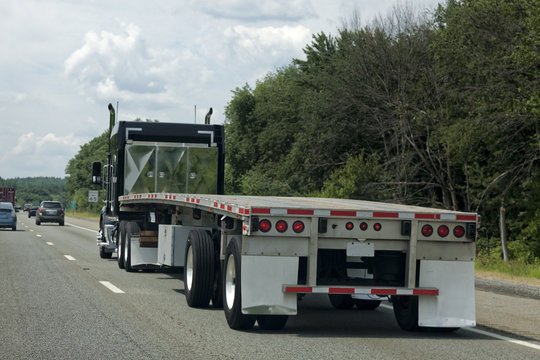Step deck trucking is a specialized freight transportation method using flatbed trailers with two deck levels to carry tall, oversized, or heavy loads that can’t fit on standard trailers. Step deck dispatch services help owner-operators and carriers find profitable loads, manage routes, negotiate rates, and ensure compliance, making logistics smoother and more efficient across the USA.
What Is Step Deck Trucking
Step deck trucking, also known as drop deck trucking, is a core part of the American freight industry. It uses trailers with a lower deck behind the tractor, allowing haulers to carry loads taller than what standard flatbeds can accommodate without violating height restrictions.
These trailers are designed for versatility, making them ideal for hauling construction equipment, machinery, building materials, and industrial freight. Because the freight sits lower to the ground, it ensures stability and safer transportation of tall and heavy cargo.
Step deck trucking companies in the USA play a vital role in keeping industrial operations running smoothly — moving critical goods across states efficiently and safely.
Why Step Deck Freight Is in High Demand
The demand for step deck freight has risen due to the growing construction, energy, and manufacturing sectors. Many industries depend on step decks for their ability to handle loads that are too tall for traditional trailers but still require open-deck transport.
Some common freight types transported by step deck trucks include:
- Construction machinery such as excavators and bulldozers
- Industrial equipment and generators
- Prefabricated structures and pipes
- Oversized cargo that cannot be containerized
This demand has created a strong need for expert step deck dispatch services to help carriers secure consistent, high-paying loads.
The Role of Step Deck Dispatch Services
A step deck dispatcher is the backbone of efficient freight movement. Dispatchers act as logistics coordinators who bridge the gap between shippers, brokers, and drivers. Their goal is to ensure that every trip is profitable, timely, and compliant with U.S. Department of Transportation (DOT) regulations.
What Step Deck Dispatchers Do
- Load Searching: They find profitable loads from trusted brokers and load boards.
- Rate Negotiation: Dispatchers negotiate rates to maximize profits while ensuring fair deals.
- Documentation and Compliance: They manage carrier packets, insurance, and regulatory compliance.
- Scheduling and Routing: They plan the most efficient routes to save time and fuel.
- 24/7 Support: Many dispatching teams offer round-the-clock assistance to handle route issues or delays.
By outsourcing these tasks, owner-operators can focus on driving rather than dealing with the administrative workload.
Benefits of Using Professional Step Deck Dispatch Services
Choosing a professional step deck dispatch service can make a measurable difference in profitability and efficiency.
Consistent Load Flow
A skilled dispatcher maintains a steady pipeline of freight, ensuring that drivers rarely experience downtime. They identify high-paying lanes, reduce deadhead miles, and help drivers stay on the road earning consistently.
Better Rate Negotiations
Dispatchers understand market fluctuations, fuel costs, and lane demand. They use this knowledge to negotiate competitive rates — ensuring that carriers get paid what their time and effort are worth.
Stress-Free Compliance
Regulations for oversized freight in the USA vary by state. A knowledgeable step deck dispatcher ensures all permits, escorts, and documents are in place before the truck moves.
Time Management
Managing paperwork, invoicing, and route planning takes hours each week. Dispatchers handle these details so drivers can focus on what they do best — hauling freight safely.
Step Deck Dispatching vs. Standard Flatbed Dispatch
Although step decks and flatbeds share similarities, their dispatching processes differ slightly due to equipment capabilities and freight types.
- Height Flexibility: Step decks can haul taller loads without needing extra permits in many cases.
- Load Variety: Step decks often carry machinery or irregular cargo that requires extra care.
- Rate Variability: Step deck loads usually pay higher rates than flatbed loads due to complexity.
Dispatchers specializing in dispatching step decks understand these differences and know how to find the most suitable loads for your equipment.
How Step Deck Dispatchers Help Owner-Operators
Independent truckers in the USA face intense competition and fluctuating rates. Partnering with an experienced step deck dispatcher can ease this pressure by streamlining logistics.
Personalized Dispatching
Each driver has unique preferences — regions they prefer, load weights, or trip lengths. Dispatchers tailor freight options accordingly, ensuring comfort and profitability.
Fuel-Efficient Route Planning
With fuel costs rising, dispatchers plan optimal routes using real-time data and mapping tools. This not only saves money but also minimizes delivery times.
Paperwork and Billing Support
Step deck dispatch services also handle invoicing, broker communication, and detention pay follow-ups — critical tasks for cash flow management.
Step Deck Freight Market in the USA
The step deck freight market has become an integral part of American supply chains. States such as Texas, California, Florida, and Ohio see high volumes of step deck traffic due to industrial and agricultural demand.
Key Industries Driving Growth
- Construction and Infrastructure: Transportation of heavy machinery and prefabricated materials.
- Oil and Gas: Hauling rigs, pipes, and drilling equipment across energy hubs.
- Agriculture: Delivering tractors, irrigation systems, and large-scale equipment.
- Manufacturing: Moving industrial machinery from plants to distributors.
With economic expansion and infrastructure investment projects increasing, step deck trucking continues to see steady growth across the U.S. logistics landscape.
Dispatching Step Decks: Best Practices
Professional dispatchers use strategic planning to ensure every haul is smooth, profitable, and compliant. Here are some best practices for dispatching step decks effectively:
Verify Load Dimensions and Weight
Always confirm load specifications to prevent violations or safety risks. Dispatchers verify height, width, and weight limits to determine route permits.
Check Weather and Route Restrictions
Weather conditions can significantly impact oversized freight movement. Dispatchers monitor forecasts and road restrictions to avoid delays.
Maintain Open Communication
Continuous communication between dispatcher and driver prevents confusion and ensures fast response to unexpected changes.
Use Technology for Load Tracking
Advanced dispatching software and GPS tracking tools help monitor real-time locations, load statuses, and delivery times.
Finding the Right Step Deck Dispatcher in the USA
Choosing a reliable dispatcher can make or break your trucking business. Look for these qualities when evaluating step deck dispatch services:
- Experience in step deck freight — specialized loads require specific expertise.
- Transparent pricing — no hidden fees or unfair commission rates.
- Strong broker relationships — ensures steady, high-quality load availability.
- 24/7 communication — responsive support is crucial for cross-country hauls.
Many top U.S.-based dispatch services operate remotely, meaning drivers across states can benefit from professional support without regional limitations.
How Step Deck Dispatch Services Support Fleet Owners
Fleet owners with multiple step deck units often rely on dispatchers to manage logistics at scale. Dispatch services can:
- Balance load assignments across multiple drivers
- Handle back-office operations and billing
- Optimize dispatching schedules for maximum utilization
- Coordinate multi-state operations efficiently
This makes dispatching not just a convenience, but an operational necessity for maintaining consistency and profitability across the fleet.
Step Deck Freight Rates and Market Trends
Freight rates for step deck loads in the U.S. depend on several variables — distance, cargo type, permits, and lane demand. Typically, step deck freight pays higher than flatbed due to the complexity of oversized cargo handling.
Recent trends show that carriers using dispatch services earn better average rates thanks to improved negotiation strategies and optimized routes. The adoption of digital dispatch platforms has also made it easier for small carriers to compete with large logistics firms.
Building a Successful Step Deck Trucking Business
Whether you’re an owner-operator or managing a small fleet, success in step deck trucking requires a mix of efficiency, compliance, and consistency.
Invest in Quality Equipment
Maintain your trailer, secure load straps, and ensure compliance with height and weight limits. Safety and reliability attract repeat customers.
Partner with an Expert Dispatcher
Working with a skilled step deck dispatch service allows you to focus on driving and customer satisfaction while professionals handle negotiations and paperwork.
Stay Informed About Regulations
Oversized freight often requires permits. Understanding interstate rules ensures smooth hauls and avoids costly fines.
The Future of Step Deck Dispatching in the USA
As logistics technology evolves, the role of step deck dispatchers is becoming even more strategic. Automation tools, digital load boards, and AI-powered routing systems are improving how dispatchers match loads, negotiate rates, and manage fleets.
Despite digital advancements, the human element — expertise, negotiation skills, and problem-solving — remains irreplaceable. Successful dispatching combines technology with experience, ensuring reliable freight movement nationwide.
Conclusion
Step deck trucking remains one of the most versatile and profitable sectors in U.S. freight transportation. Its ability to handle oversized, tall, and complex cargo makes it indispensable for industries like construction, manufacturing, and energy.
However, success in this sector depends heavily on professional step deck dispatch services. A skilled step deck dispatcher ensures that every load is profitable, every trip is compliant, and every mile counts toward sustainable growth.
For owner-operators and fleet owners looking to maximize performance, partnering with expert dispatching step decks professionals is the key to staying competitive in today’s evolving logistics market.



